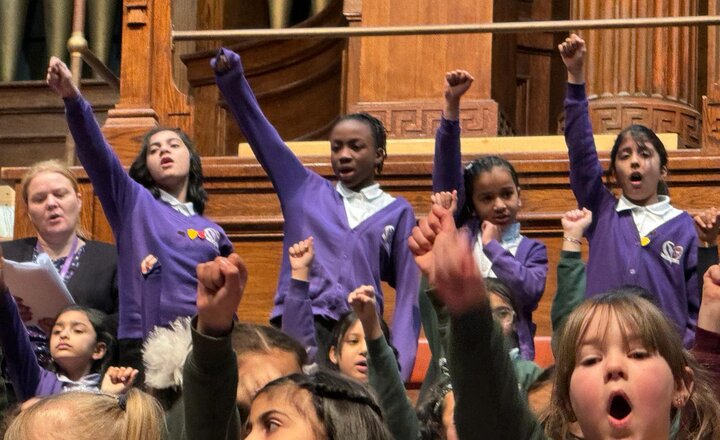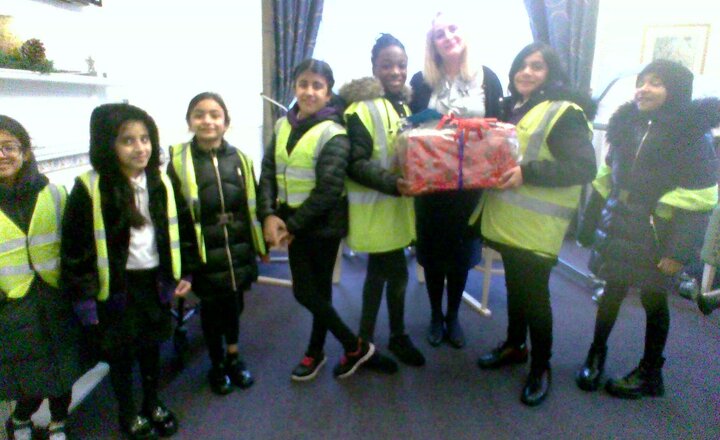Why do we teach Music?
At St. Silas, we believe that Music is a universal language which contributes to the social, emotional and creative development of each child. We aim to teach Music through a purposeful and engaging curriculum; making learning engaging, inspiring and challenging to equip children with the knowledge and skills needed to create their own music and critique others’.
‘Music is all around us. It is the soundtrack to our lives. Music connects us through people and places in our ever-changing world. It is creative, collaborative, celebratory and challenging. Music can bring communities together through the shared endeavour of whole-school singing, ensemble playing, experimenting with the creative process and, through the love of listening to friends and fellow pupils, performing.’ MMC 2021
Aims:
To ensure that all pupils:
-
perform, listen to, review and evaluate music across a range of historical periods, genres, styles and traditions, including the works of the great composers and musicians
-
learn to sing and to use their voices, to create and compose music on their own and with others, have the opportunity to learn a musical instrument, use technology appropriately and have the opportunity to progress to the next level of musical excellence
-
understand and explore how music is created, produced and communicated, including through the inter-related dimensions: pitch, duration, dynamics, tempo, timbre, texture, structure and appropriate musical notations.
What do we teach?
EYFS (Expressive Arts and Design)
The development of children’s artistic and cultural awareness supports their imagination and creativity. It is important that children have regular opportunities to engage with the arts, enabling them to explore and play with a wide range of media and materials. The quality and variety of what children see, hear and participate in is crucial for developing their understanding, self-expression, vocabulary and ability to communicate through the arts. The frequency, repetition and depth of their experiences are fundamental to their progress in interpreting and appreciating what they hear, respond to and observe.
Children in Reception will be learning to:
-
Explore, use and refine a variety of artistic effects to express their ideas and feelings.
-
Return to and build on their previous learning, refining ideas and developing their ability to represent them.
-
Create collaboratively, sharing ideas, resources and skills.
-
Listen attentively, move to and talk about music, expressing their feelings and responses.
-
Watch and talk about dance and performance art, expressing their feelings and responses.
-
Sing in a group or on their own, increasingly matching the pitch and following the melody.
-
Explore and engage in music making and dance, performing solo or in groups.
Key stage 1
Pupils should be taught to:
-
use their voices expressively and creatively by singing songs and speaking chants and rhymes
-
play tuned and untuned instruments musically
-
listen with concentration and understanding to a range of high-quality live and recorded music
-
experiment with, create, select and combine sounds using the inter-related dimensions of music.
Key stage 2
Pupils should be taught to sing and play musically with increasing confidence and control. They should develop an understanding of musical composition, organising and manipulating ideas within musical structures and reproducing sounds from aural memory.
Pupils should be taught to:
-
play and perform in solo and ensemble contexts, using their voices and playing musical instruments with increasing accuracy, fluency, control and expression
-
improvise and compose music for a range of purposes using the inter-related dimensions of music
-
listen with attention to detail and recall sounds with increasing aural memory
-
use and understand staff and other musical notations
-
appreciate and understand a wide range of high-quality live and recorded music drawn from different traditions and from great composers and musicians
-
develop an understanding of the history of music.
As pupils progress, they will develop a critical engagement with music, allowing them to ‘act as a musician’ and ‘think like a musician’. We want our children to have a wide range of musical experiences and develop an appreciation of music from their own cultural heritage and from other cultures around the world. All children will have the opportunity to sing, to listen to music, to experience different musical instruments, to perform and to enjoy music at all key stages.
music
How do we teach Music?
The programmes of study of the National Curriculum for Music and the Model Music Curriculum underpin teaching and learning. Music is delivered in two ways throughout the school: EYFS and Year 1 are taught by ST SIlas Staff who use an interactive platform from the BBC and Years 2 to 6 are taught by Junior Jam. As recommended in the MMC children are taught to play an instrument which supports the development of their skills and understanding in reading music.
All music lessons contain elements of the 4 key areas: singing, listening, composing, and musicianship and performing. Both tuned and un-tuned instruments are used to broaden our children’s experiences and knowledge through listening, appraising, composing and performance. Our children learn how to perform, listen to, review and evaluate music across a range of historical periods, genres, styles and traditions. They learn to sing and use their voices as an instrument whilst understanding and exploring how music is created, composed and produced using technology and instruments.
How do we meet the needs of all children?
The teaching and learning of music skills follows a spiral (repetition-based approach) allowing pupils to both develop new musical skills and concepts, and re-visit established musical skills and concepts. Repeating a musical skill doesn’t necessarily mean their progress is slowing down or their development is moving backwards! It's just shifting within the spiral allowing pupils to develop both a deeper understanding of musical skills and concepts and learning something new. Every learning opportunity is planned to meet the needs of the children and adapted for individual needs where necessary, in particular those with SEND. As music is a practical and creative subject it allows pupils to make mistakes, rehearse, try something out, perfect and work collaboratively or cooperatively with others; thus building resilience. We aim for music to increase our pupils self-confidence, creativity and sense of achievement.
Assessment
As pupils progress, they will develop a growing musical vocabulary that allows them to critically engage with music. Teaching and learning of music is a reflective process for the children as they are given the opportunities to assess themselves and their peers. The children also celebrate their success and skills with their peers and wider audiences. We assess through teacher assessment and use pictures and video evidence to capture children’s progress throughout the year.
Message from the Subject Leader
Hi! My name is Miss Alison Morgan and I wake up every morning with a tune playing in my head - I love music! My main passion is singing; I sing in a variety of choirs and have achieved the Bishop of Blackburn’s Chorister Award. When I was a child, I played piano, violin and recorder and enjoyed performing in ensembles and orchestras. I enjoy using music in my teaching to help children learn facts whilst practising their music skills. Bolton Music Hub hold network meetings which I attend so that I keep up to date with professional developments and am able to ensure our pupils have the best possible teaching and learning experiences.
Clubs
There is a weekly KS2 choir club ( Autumn and SPring Terms) which gives many opportunities throughout the year to sing to live audiences. In the summer term there is a chair drumming club. Both of these clubs count as hours towards Children’s University.
Additional Information
https://www.outoftheark.co.uk/blog/why-singing-is-good-for-pupil-well-being/
https://www.bbc.co.uk/teach/bring-the-noise
https://www.juniorjam.co.uk/musicandarts/
Useful Websites
https://musiclab.chromeexperiments.com/
https://boltonmusicservice.com/
https://www.apple.com/uk/mac/garageband/
Google Chrome Music Lab (available through Google classroom)
https://boltonmusicservice.com/



.jpg)